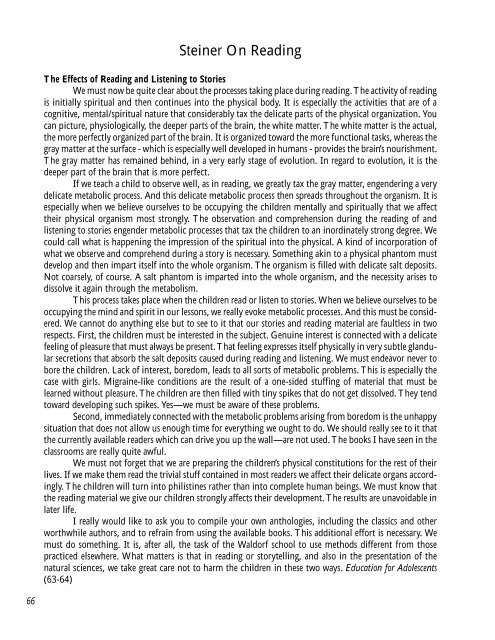Colloquium on English - Research Institute for Waldorf Education
Colloquium on English - Research Institute for Waldorf Education
Colloquium on English - Research Institute for Waldorf Education
Create successful ePaper yourself
Turn your PDF publications into a flip-book with our unique Google optimized e-Paper software.
66<br />
Steiner On Reading<br />
The Effects of Reading and Listening to Stories<br />
We must now be quite clear about the processes taking place during reading. The activity of reading<br />
is initially spiritual and then c<strong>on</strong>tinues into the physical body. It is especially the activities that are of a<br />
cognitive, mental/spiritual nature that c<strong>on</strong>siderably tax the delicate parts of the physical organizati<strong>on</strong>. You<br />
can picture, physiologically, the deeper parts of the brain, the white matter. The white matter is the actual,<br />
the more perfectly organized part of the brain. It is organized toward the more functi<strong>on</strong>al tasks, whereas the<br />
gray matter at the surface - which is especially well developed in humans - provides the brain’s nourishment.<br />
The gray matter has remained behind, in a very early stage of evoluti<strong>on</strong>. In regard to evoluti<strong>on</strong>, it is the<br />
deeper part of the brain that is more perfect.<br />
If we teach a child to observe well, as in reading, we greatly tax the gray matter, engendering a very<br />
delicate metabolic process. And this delicate metabolic process then spreads throughout the organism. It is<br />
especially when we believe ourselves to be occupying the children mentally and spiritually that we affect<br />
their physical organism most str<strong>on</strong>gly. The observati<strong>on</strong> and comprehensi<strong>on</strong> during the reading of and<br />
listening to stories engender metabolic processes that tax the children to an inordinately str<strong>on</strong>g degree. We<br />
could call what is happening the impressi<strong>on</strong> of the spiritual into the physical. A kind of incorporati<strong>on</strong> of<br />
what we observe and comprehend during a story is necessary. Something akin to a physical phantom must<br />
develop and then impart itself into the whole organism. The organism is filled with delicate salt deposits.<br />
Not coarsely, of course. A salt phantom is imparted into the whole organism, and the necessity arises to<br />
dissolve it again through the metabolism.<br />
This process takes place when the children read or listen to stories. When we believe ourselves to be<br />
occupying the mind and spirit in our less<strong>on</strong>s, we really evoke metabolic processes. And this must be c<strong>on</strong>sidered.<br />
We cannot do anything else but to see to it that our stories and reading material are faultless in two<br />
respects. First, the children must be interested in the subject. Genuine interest is c<strong>on</strong>nected with a delicate<br />
feeling of pleasure that must always be present. That feeling expresses itself physically in very subtle glandular<br />
secreti<strong>on</strong>s that absorb the salt deposits caused during reading and listening. We must endeavor never to<br />
bore the children. Lack of interest, boredom, leads to all sorts of metabolic problems. This is especially the<br />
case with girls. Migraine-like c<strong>on</strong>diti<strong>on</strong>s are the result of a <strong>on</strong>e-sided stuffing of material that must be<br />
learned without pleasure. The children are then filled with tiny spikes that do not get dissolved. They tend<br />
toward developing such spikes. Yes—we must be aware of these problems.<br />
Sec<strong>on</strong>d, immediately c<strong>on</strong>nected with the metabolic problems arising from boredom is the unhappy<br />
situati<strong>on</strong> that does not allow us enough time <strong>for</strong> everything we ought to do. We should really see to it that<br />
the currently available readers which can drive you up the wall—are not used. The books I have seen in the<br />
classrooms are really quite awful.<br />
We must not <strong>for</strong>get that we are preparing the children’s physical c<strong>on</strong>stituti<strong>on</strong>s <strong>for</strong> the rest of their<br />
lives. If we make them read the trivial stuff c<strong>on</strong>tained in most readers we affect their delicate organs accordingly.<br />
The children will turn into philistines rather than into complete human beings. We must know that<br />
the reading material we give our children str<strong>on</strong>gly affects their development. The results are unavoidable in<br />
later life.<br />
I really would like to ask you to compile your own anthologies, including the classics and other<br />
worthwhile authors, and to refrain from using the available books. This additi<strong>on</strong>al ef<strong>for</strong>t is necessary. We<br />
must do something. It is, after all, the task of the <strong>Waldorf</strong> school to use methods different from those<br />
practiced elsewhere. What matters is that in reading or storytelling, and also in the presentati<strong>on</strong> of the<br />
natural sciences, we take great care not to harm the children in these two ways. Educati<strong>on</strong> <strong>for</strong> Adolescents<br />
(63-64)

















